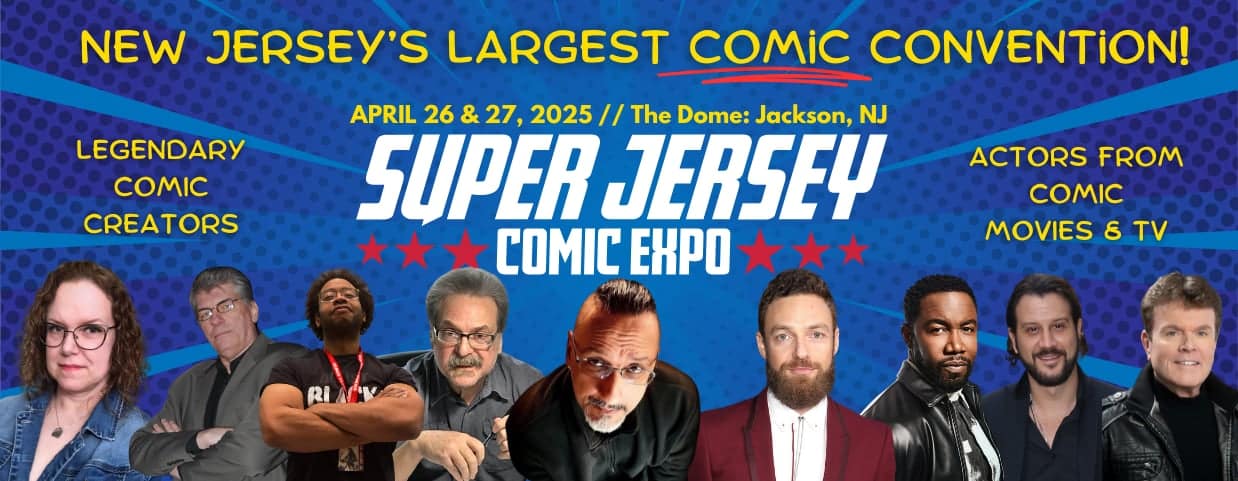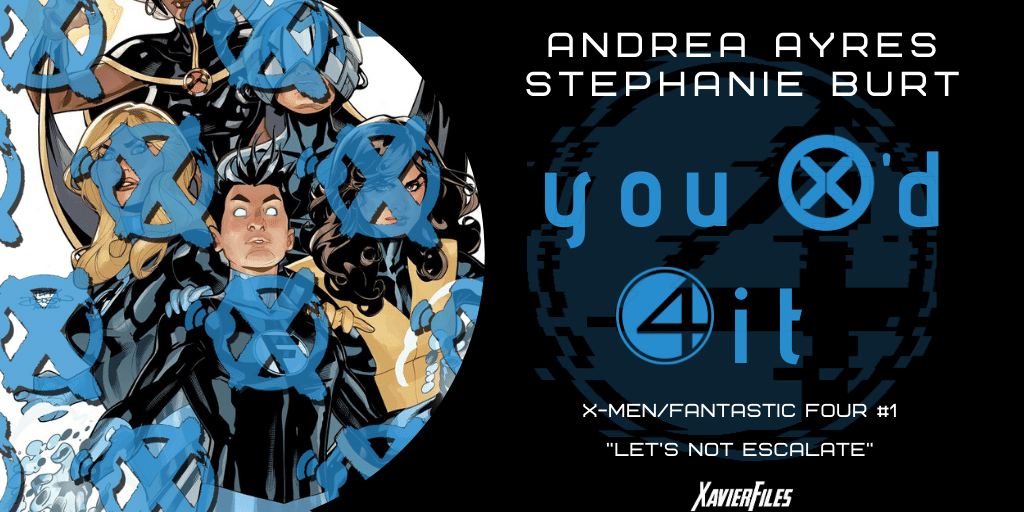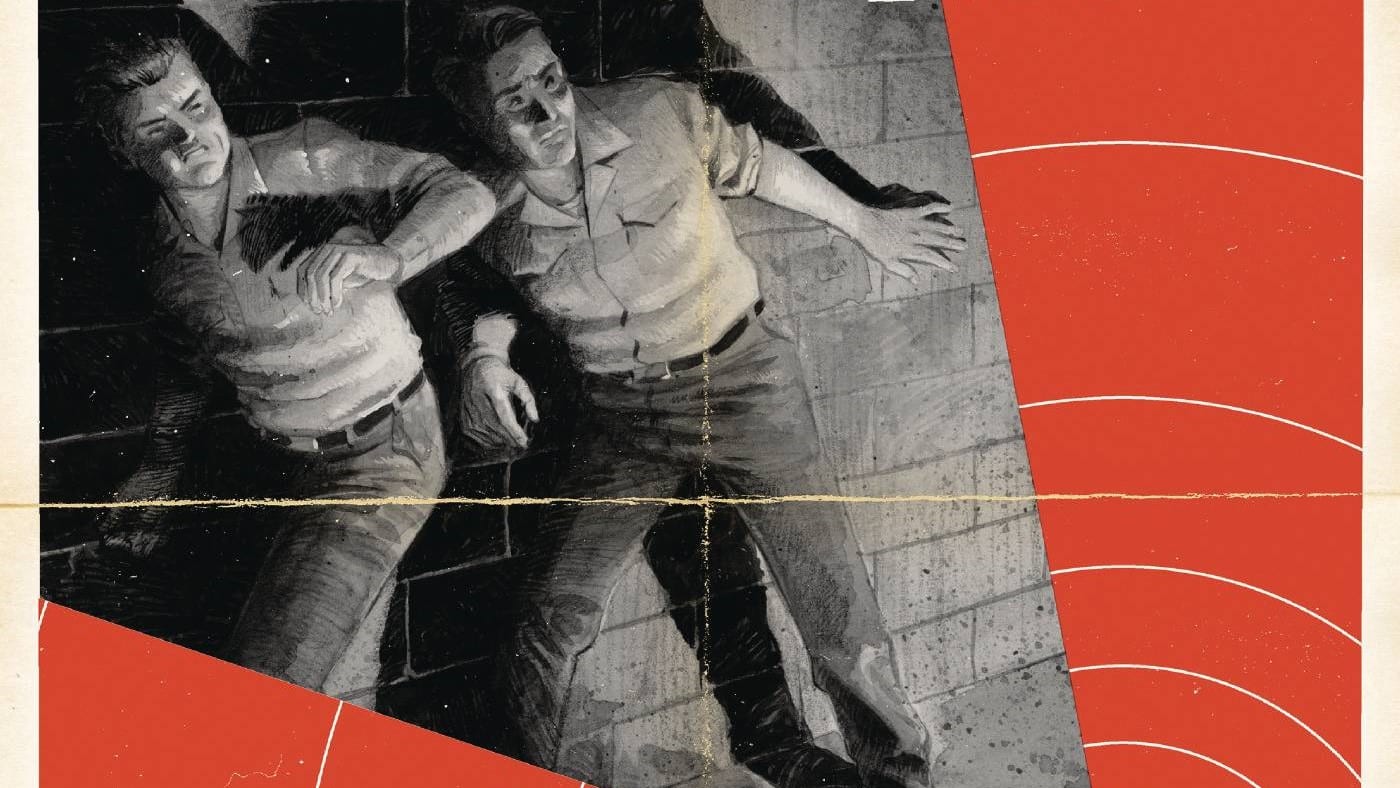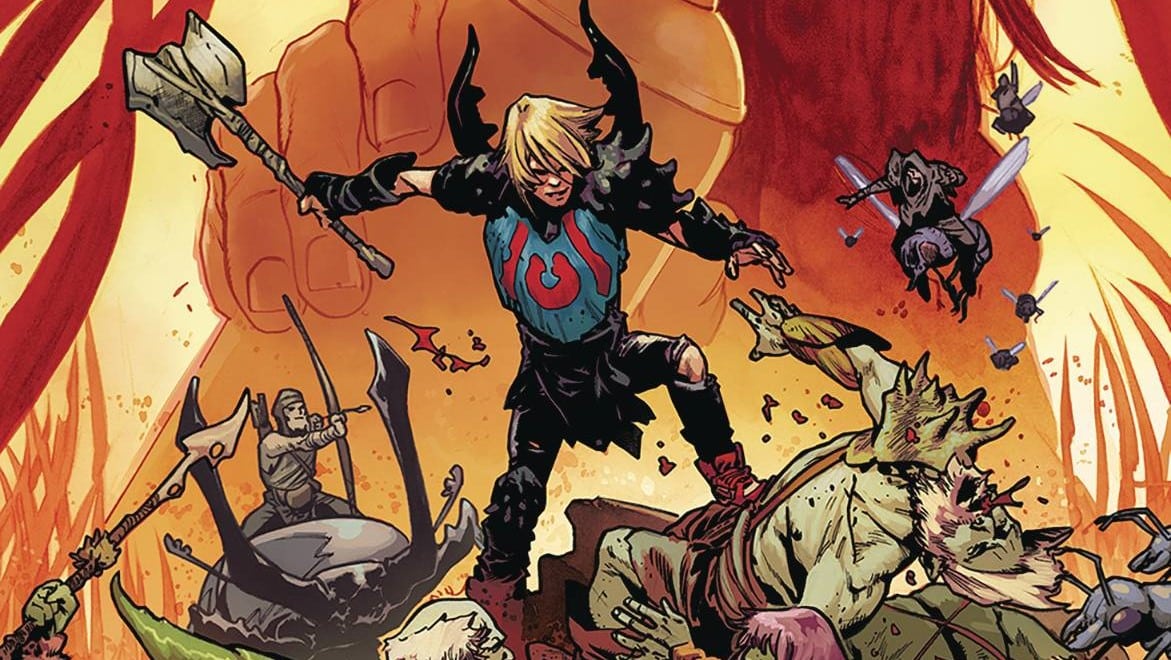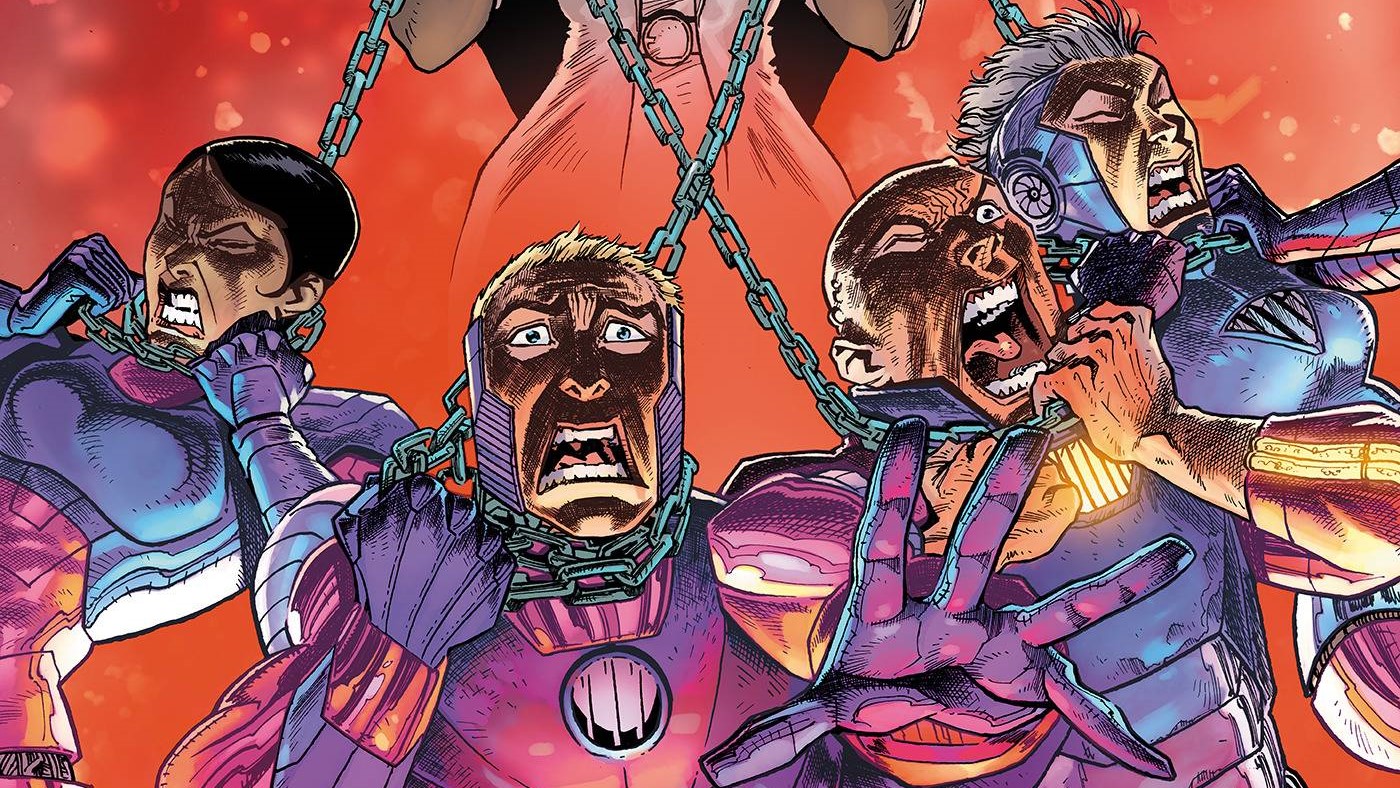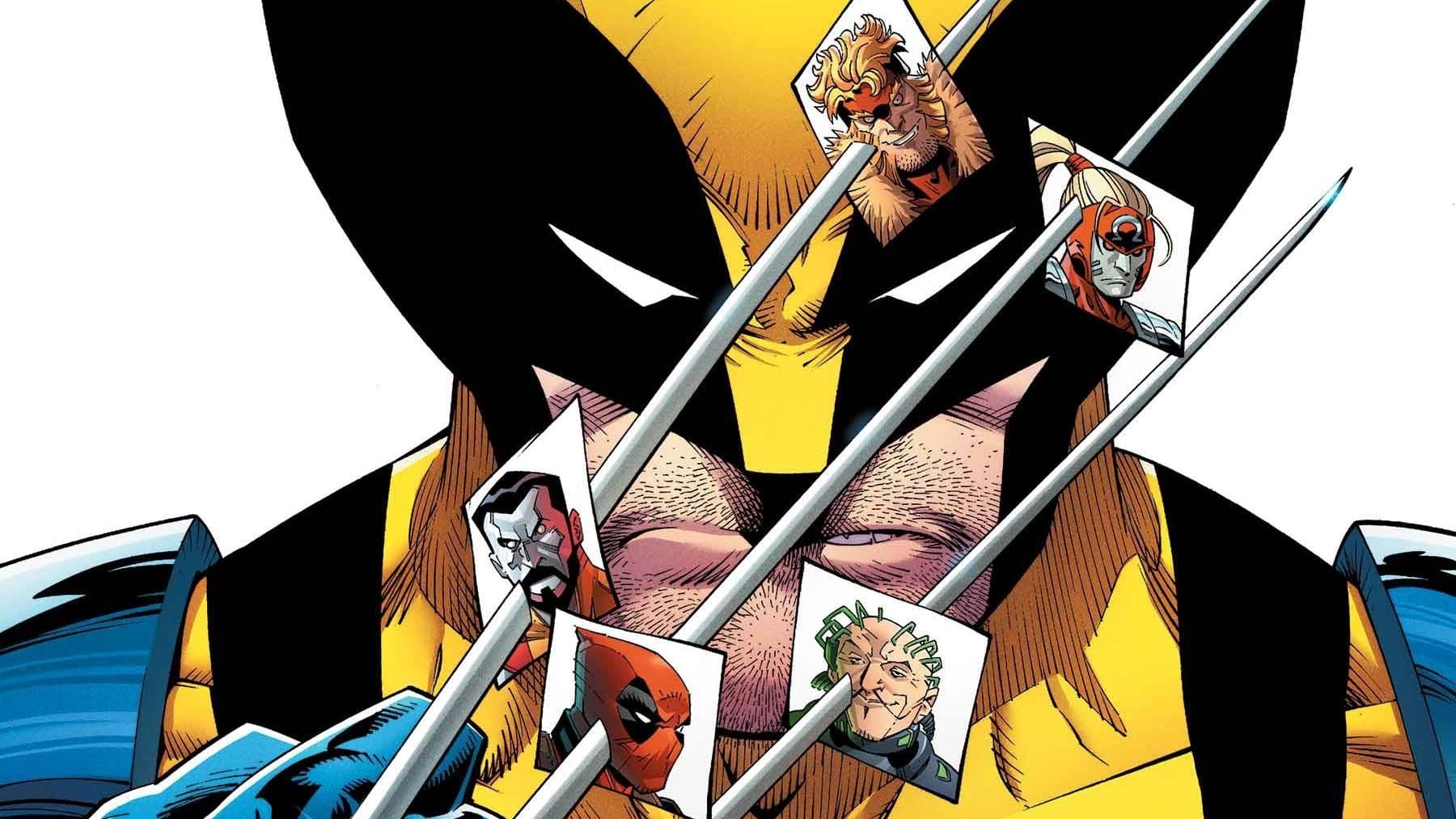Mutants have a new home in Krakoa. They have come from far and wide, from all backgrounds, to join a community of their fellow Homo Superior. But one Omega Mutant has ignored the call. In X-Men/Fantastic Four Chip Zdarsky, Dodsons Terry & Rachel, Laura Martin, Dexter Vines and Karl Story come together to tell the tale of Franklin Richards, the son of Marvel’s First Family, as he chooses between his life on Yancy Street, and the world of Krakoa.
Andrea Ayres: What a start! So much of this issue seems to be setting up what this series will be dealing with and that appears to be the concept of protection. Not only protection but how and who gets to define what protection is and what shape it takes. The best way to protect those we love is to listen to them when they tell us what they need and what makes them feel safe. I feel like what this first issue deals with so well. It’s not only about getting a safe space, it’s about having the freedom to create one for yourself. That is a freedom Sue and Reed Richards have denied Franklin. I’m curious to hear your first impressions?
Stephanie Burt: So much going on here! I kind of love it. I see callbacks to the 1987 X-Men vs. Fantastic Four mini-series and also to the recent Marvel Two-in-One with Ben and Johnny (which Zdarsky wrote). In mutant metaphor terms, we get mutants as Jews, with Krakoa as the mutant homeland. But we also get mutants as weird kids, disabled kids, trans kids, kids whose difference can be medicalized (either with or without the kid’s consent).
Protect Who?

SB: Franklin’s opening narration sets up Franklin as a gifted white kid with a responsible family; kid, and later mutant teen, who can pass for baseline human if he wants; a kid who’s generally celebrated for his uniqueness, treated as awesome, except that he’s often in danger. He’s “The Impossible Boy,” just like Kate has been the girl who walks through walls. So we get a parallel between Franklin and Kate that’s going to last. The parallel calls back to FFvX, where she was the teen whose powers were out of control, who Reed was trying hard– and failing– to fix; in that story it was Franklin and only Franklin who persuaded her to stay alive.
AA: I love the opening panel and how crowded it is. Everyone has surrounded the “Impossible Boy”. The reader’s eye is drawn less to the newborn than to the doting parents as they look on lovingly. The panel draws our eye inward, like a spotlight. There is a suffocating quality to this moment. It invokes a feeling of breathlessness and the weight of expectations placed on us at birth. The expectations, rules and behaviors our families place on us begin early. In fact, families create their own social realities by which they operate. It feels like that’s what is being set up here.
The technical term for this is Family Communications Theory. [Ed. note: Koerner, A. F., & Fitzpatrick, M. A. (2006). Family Communication Patterns Theory: A Social Cognitive Approach. In D. O. Braithwaite & L. A. Baxter (Eds.), Engaging theories in family communication: Multiple perspectives (p. 50–65)]
There are four main communication patterns families use: consensual, pluralistic, protective and lassiez-faire. We’ll get into this more in later issues but I’m intrigued by the degree to which the Richards’s reflect a protective communication system. Protective families place high expectations on their children and do not expect nor do they create space for pushback. The protective family system has a high degree of negative emotions, feelings, and hostility. Bingo, Bango. I think we get that a lot of it thanks to how Reed sees himself and his position in the family. What’d you think of the opening?
SB: Franklin worries about power loss. That’s narratively required because Chuck needs a non-terrible reason to bring him to Krakoa now, rather than waiting till he turns 18. The power loss doesn’t make sense with Jews as mutants– you’re not less Jewish when you turn 18– but it makes a ton of sense with mutants as trans kids, since parents who won’t allow medical interventions for trans kids who require those things are parents who want those kids to “grow up” to be “normal”… and they can do irreversible damage. The Israel analogy makes Chuck and Kate look awful; the trans analogy makes Reed and Sue indefensible. The beauty of the mutant metaphor, I think, is that you can read it both ways.
AA: I can’t get over the sense here that we’re talking about identity. Contrary to what many folks believe we begin the process of developing our identity in childhood. [Ed. note: Reese E., Yan C., Jack F., Hayne H. (2010) Emerging Identities: Narrative and Self from Early Childhood to Early Adolescence. In: McLean K., Pasupathi M. (eds) Narrative Development in Adolescence. Advancing Responsible Adolescent Development. Springer, Boston, MA]
Teenagers get the added benefit, however, to experience the developing brain’s ability to understand how they can shape and influence others perceptions of them based. Essentially, teens develop the ability to be self-reflective. We see a lot of that happening in this first issue thanks to Franklin’s narration.
Powers That Be

You grow up fast once you realize you’re a mutant.
AA: My twin sister has dyslexia. It made test-taking really hard on her growing up but because she was a deviation from the expected norm the responsibility was placed on her to ask for and find accommodation. Growing up, this put an expectation on her that didn’t exist for me. She had to learn how to navigate systems that were simply present for me. She had to grow up faster than I did because of it. I can’t help but think of her as we hear Franklin speak to his experiences. It’s particularly painful to hear him talk about his loss of powers.
SB: Why is Franklin losing his powers? In Zdarsky’s Marvel Two-in-One, Ben and Johnny were both losing theirs, and the reason turned out to be….separation from family. What if Franklin’s losing his powers due to….separation from mutants (found family)?
AA: I mean, I think you just figured out the series, so we’re done now right? There are a few panels on page 13 which are really instructive both towards the understanding of family systems and identity/powers.
He doesn’t understand that… I’m not perfect. We’re a good family.
Reed and Sue continue to center the understanding of their child on their lived experiences without taking into consideration who Franklin is and who he wants to be. “We’re a good family.” The phrase serves as an inoculation for their behaviors and actions towards their son. It doesn’t work. Just because I feel like I’m doing the right thing doesn’t mean it is.
Even without your stretchy bits, you’re still incredibly smart.
This is another way in which family systems are upheld in Richards’s family. Protecting Reed’s ego comes first.
Reed needs people to believe he is good. He requires it from his family. Why? Deep down Reed questions his goodness so he shifts the burden of creating a mythos of goodness to everyone around him. Sue navigates this space by comforting him first: she tends to place his emotional needs above hers. The Dodson’s work shines here. Sue has a slight furrowing of the brow, the kind that’s there to indicate a hope the message she is trying to get across makes it. It’s barely there but it communicates so much.
SB: You know who’s not a mutant and isn’t a Richards? You know who Franklin can ask about this stuff? Ben Grimm. But when Franklin and Ben talk, it’s not about how they can be their best selves; it’s about who can pass, and about Reed wants to, or tries to, “fix.” It also ties Franklin more closely to Kate, since both of them are mutants who can pass.
AA: Again, see how everyone insists on how good Reed is? That’s how protective families work. That’s family communication systems at play. I’m glad you brought up Ben’s comment and history with being fixed. It’s so important that we unpack Reed wanting to fix others. Protecting people, giving them normalcy (even if they don’t want it) doesn’t fix anything at all. Who is defining what it means to be fixed? It seems to come from Reed.
AA: On page 15 we see a close-up of Franklin and Ben’s eyes. Franklin asks the question we’ve all been wondering: “So why is it exactly that the two problems he can’t solve, are you and me?”
Franklin has internalized the belief there is something problematic about him or that he is something that needs fixing, powers or not. It’s really pretty sad.
SB: Kate, too, has sometimes wanted to be normal, wished that she could just be normal. Think about all the times she’s quit the team. It’s something else that brings Kate and Franklin together, and separates them from mutants who can’t or won’t pass. Franklin and Kate have also been wanted children: adults fight over them, adults want pieces of them. So many other X-characters have been unwanted: runaways, homeless, refugees. Not this pair.
Speaking of eyes: the Dodsons rock my world, but I want to recognize Laura Martin’s colors. It’s a story about space, about who belongs in what space, and Martin’s colors distinguish each space from the rest. The fight scene takes place in the exposed outdoors, blue skies and green grass and beige cityscapes, where Franklin’s exposed to the gaze of adults. In the red bedroom with its self-contained spheres, Franklin and Val can be their own kids. And then the deep blues and blacks of the ocean and the cramped interiors on the Marauder, in the final pages… that’s a space of transition, not a place to arrive.
Finding Family

AA: The other main theme the series seems to be setting us for is the idea of what it means to find family, the place we are accepted and belong. Which naturally leads us to Krakoa.
SB: Now that we’re on Krakoa… “Bobby and Pyro are really getting on my nerves,” says Storm. So say we all. Kate looks wonderful, I think– confident and windswept and only a little pin-up-ish– what I’d expect from the Dodsons. The ship docks at the same inlet that Kate used in Marauders #1, with the same running gag about Logan’s beer.
I found myself paying attention to who called Kate what name: part of becoming yourself is choosing your name. Since Quentin is the worst, he makes a point of deadnaming Kate when he knows better. The Cuckoos call him out for it. Once Kate gets into the Quiet Council offices. Chuck makes a point of calling her, not Kate (her adult name), not Kitty (her kid name), but Katherine. He’s called her Katherine before, of course, but the formality really establishes that he still feels like her teacher, and to him, she’s still like a student. One of Kate’s through-lines since her first appearance has been “Am I always the gifted youngster? Am I always the good girl? Am I always the smart young kid?” And this interaction re-establishes that: she’s going to connect to Franklin on that basis.
AA: I think you are absolutely right about that Stephanie. On page 17 there’s a pulled back view of Sue as Magneto arrives. This panel feels important because even though everyone is there to talk about Franklin, the focus is anywhere but on what he wants, desires or needs.
SB: During the fight in Washington Square Park (where he’s literally front and center on one page) Magneto gets everything right and everything wrong about the mutants’ position: “Your child does not belong to you!” (Right on!) “He is a mutant! He is power!” Nope, he’s a teen and adults are having a nonsense fight over him as if he were the incarnation of some principle.
“We’re here about birthright,” Magneto goes on. Birthright being, in our world, a program that offers American teens free trips to Israel. Kate comes across as the only adult who sees Franklin as a person who deserves to feel his own feelings and make his own choices, rather than a beloved possession. Yay Kate!
AA: Sue’s response to Magneto talking about birthright is very interesting.
Don’t talk about birthright to the woman who gave birth to him you–
Giving birth to someone doesn’t mean you can’t be questioned. What Sue is putting forward here is that by nature of giving birth to Franklin her opinions and desires matter more than anyone’s. I think what I’m uncomfortable with is the idea of Sue talking about her child as if it were a thing she owned.
SB: As if he belonged in her house, or her city, forever.
AA: YES! Meanwhile, inside the Reed residence…
SB: “Franklin Richards is one of us and belongs there,” Chuck tells Reed and Sue while Franklin waits on the stairs with Kitty and the two of them watch old people have an academic debate. You dumbos. Ask Franklin. Let him choose. Respect his choice.
AA: That’s the beauty and tragedy in all of this, isn’t it? It’s not actually that difficult. Ask Franklin.
SB: Sue argues against “segregation”: it’s potentially an argument against single-sex schools, against separate classes for gifted kids, against ethno-nationalist state formation, against Deaf culture, against queer-and-trans-only spaces, against residential segregation by race and income… again, a lovely thing about the mutant metaphor is that it can stand for many kinds of real-world differences, kinds about which our instincts– at least my instincts– point in opposing directions. But the arguments aren’t necessarily good faith. Really Sue just doesn’t want him to leave.
AA: Like you point out Steph, she’s searching for a justification that will placate everyone (including herself). All of this action is happening and still we don’t know what Franklin is feeling. Both families, led by men who both believe they are in the right, have failed to ask for or communicate their emotional needs or inquire about the needs of others. The only person actually doing this is Kate.
SB: “No matter what you decide I’ll back you,” says Kate. Go Kate! And they hold hands (in an entirely nonromantic way). Also, she doesn’t correct him when he deadnames her, because he’s a well-intentioned kid.
After the callback in Marauders to Kate’s teenage choice between Xavier and Emma Frost, I was hoping this story would call back to her choice too. Not happening, or at least I didn’t see it.
And then Franklin has the right conversation with Kate and does the right thing and makes his own choices and rushes through the gates (makes Aliyah; leaves home; goes on hormones; adopts ASL as his primary language; apply the metaphor the way you like), or rather he tries to do so and he can’t, because his dad, under the guise of fixing him, has made it impossible for him to choose where to live, how to live, and who he can be. He can’t go through the allegorical gate, because his dad wants him to be normal.
Franklin and Kate are now the only mutants who can’t go through a Krakoan gate. Again, they have so much in common!
AA: On page 34 we have Franklin highlighting the tension of found family versus birth family.
I was born a mutant, born to be with mutants. But I was born into the Fantastic Four. Which means I have twice as many enemies.
It’s a powerful statement and one that lays plain the tension of what it means to find yourself and lay claim to an identity that may exist on the margins. Identity is not any one thing, we are all multiples and multitudes. Some of us have an easier time laying claim to these different facets of ourselves because of the dominant societal and social structures.
SB: And there, at the end, we get the last callback to the earlier FFvX: Doom is always, always looking for a way to hurt Reed Richards.
X-Traneous Thoughts

- The creative team here has really woven a ton of interesting threads for us to follow: get ready to dive into family systems theory as the series progresses.
- Who’s older than Kate and usually knows right from wrong? Ororo. What role will she play? Who else are we going to see? Will we get callbacks to other moments in the life of Franklin? Or of Kate?
- Doom’s going to undermine Reed, but how? By holding Franklin hostage? By delivering him to Krakoa, where he and Val were hoping to go anyway? By handing the whole shipload over to Reed?
- This issue’s inker Dexter Vines was recently diagnosed with Multiple Myeloma, a cancer that attacks the plasma of the blood. There’s a GoFundMe set up to help cover his treatment.
Andrea Ayres writes about comics and culture. She loves research, coffee, and lifting weights.
Stephanie Burt is Professor of English at Harvard and the author of several books of poetry and literary criticism, most recently Don’t Read Poetry: A Book About How to Read Poems (Basic, 2019). Her nose still hurts from that thing with the gate.

